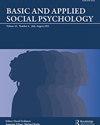二元古典主义:评价穷人的敌对和仁爱思想的重要性
IF 1.8
3区 心理学
Q2 PSYCHOLOGY, SOCIAL
引用次数: 11
摘要
我们提出了一个矛盾的阶级主义模型,其中对穷人的敌对(公开消极和侮辱)和仁慈(主观上积极但居高临下)态度并存,并独立地预测了限制性和持续贫困的福利政策的支持。鉴于现有的阶级歧视量表主要衡量对穷人的反感,我们开发并验证了矛盾阶级歧视量表(ACI),这是一个20个项目的量表,捕捉了对穷人的敌意和仁慈态度。ACI有一个敌对因素(敌对阶级主义)和两个友好因素(保护性家长制和互补的阶级分化)。四个样本(共1543个)的数据表明,ACI具有良好的信度和效度。研究结果强调了仁慈信仰在阶级主义态度中的作用。讨论了项目生成、分析方法和含义。本文章由计算机程序翻译,如有差异,请以英文原文为准。
Ambivalent Classism: The Importance of Assessing Hostile and Benevolent Ideologies about Poor People
Abstract We present a model of ambivalent classism in which hostile (overtly negative and insulting) and benevolent (subjectively positive but condescending) attitudes about poor people co-exist and independently predict endorsement of restrictive and poverty-perpetuating welfare policies. Whereas existing classism scales predominantly measure antipathy toward poor people, we developed and validated the Ambivalent Classism Inventory (ACI), a 20-item scale that captures both hostile and benevolent attitudes toward poor people. The ACI has one hostile factor (hostile classism) and two benevolent factors (protective paternalism and complementary class differentiation). Data from four samples (total n = 1,543) indicate that the ACI has good reliability and validity. Findings underscore the role of benevolent beliefs in classist attitudes. Item generation, analytical methods, and implications are discussed.
求助全文
通过发布文献求助,成功后即可免费获取论文全文。
去求助
来源期刊

Basic and Applied Social Psychology
PSYCHOLOGY, SOCIAL-
CiteScore
4.50
自引率
12.50%
发文量
7
期刊介绍:
Basic and Applied Social Psychology (BASP) emphasizes the publication of outstanding research articles, but also considers literature reviews, criticism, and methodological or theoretical statements spanning the entire range of social psychological issues. The journal will publish basic work in areas of social psychology that can be applied to societal problems, as well as direct application of social psychology to such problems. The journal provides a venue for a broad range of specialty areas, including research on legal and political issues, environmental influences on behavior, organizations, aging, medical and health-related outcomes, sexuality, education and learning, the effects of mass media, gender issues, and population problems.
 求助内容:
求助内容: 应助结果提醒方式:
应助结果提醒方式:


